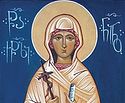

| Previous day | Next day |
| Old Style
May 19
|
Wednesday |
New Style
June 1
|
|
6th Week after Pascha.
Tone 5.
Fast Day. |
Fish, wine and oil allowed.
|
![]() Hieromartyrs Patrick, bishop of Prusa, and his companions: priests Acacius, Menander, and Polyenus (ca. 100).
Hieromartyrs Patrick, bishop of Prusa, and his companions: priests Acacius, Menander, and Polyenus (ca. 100). ![]() St. Cornelius, founder of Komel Monastery (Vologda) (1537).
St. Cornelius, founder of Komel Monastery (Vologda) (1537). ![]() St. Demetrius Donskoy, great prince of Moscow (1389). and his wife St. Eudocia, in monasticism Euphrosyne, princess of Moscow (1407).
St. Demetrius Donskoy, great prince of Moscow (1389). and his wife St. Eudocia, in monasticism Euphrosyne, princess of Moscow (1407).
Martyr Acoluthus of Hermopolis, Egypt (284-303). St. John, bishop of Gothia in the Crimea (790). St. Cornelius, founder of Paleostrov Monastery (Karelia) (ca. 1420) and his disciple Abramius (15th c.). St. John, prince of Uglich, tonsured as Ignatius (Vologda) (1523). St. Sergius, monk, of Shukhtom (1609). Right-believing Prince Vladimir II (Basil) Monomakh of Kievan Rus (1125). St. Nicholas Rynin, fool-for-Christ, of Vologda (1837).
New Hieromartyrs Anthony (Pankeyev), bishop of Belgorod, and with him priests Mitrophan, Alexander, Michael, Matthew, Hippolytus, Nicholas, Basil, Nicholas, Maxim, Alexander, Paul, and Paul; and Martyrs Michael and Gregory (1938). New Hieromartyr Onuphrius (Gagaliuk), archbishop of Kursk and Oboyansk (1938). New Hieromartyr Valentin (Lukianov), hieromonk, of Romashkovo (Moscow) (1940). New Hiero-confessor Seraphim (Zagorovsky), hieromonk, of Kharkov (1943). Synaxis of the Hieromartyrs of Kharkov.
Finding of the Icon of the Most Holy Mother of God “Of the Meeting,” in Kalamata, the Peloponnese.
Martyrs Parthenius and his brother Calogerius at Rome (250). St. Theotima of Nicomedia (311). Entrance into Georgia of St. Nina (Nino), Equal-to the-Apostles (323). St. Dunstan, archbishop of Canterbury (988). Monk-martyrs and confessors John, Conon, Jeremiah, Cyril, Theoctistus, Barnabas, Maximus, Theognostus, Joseph, Gennadius, Gerasimus, Mark, and Herman, of Kantara Monastery on Cyprus, who suffered under the Latins (1231).
Commemoration of the ascetics of St. Athanasius of Syandem Monastery: Elias (also of Valaam), Theophanes, and Dionysius. Repose of Elder Cleopas of Valaam, disciple of St. Paisius (Velichkovsky) (1816).
Thoughts for Each Day of the Year
According to the Daily Church Readings from the Word of God
By St. Theophan the Recluse

Wednesday. [Acts 18:22–28; John 12:36–47]
Lord who hath believed our report? (Is. 53:1), the Prophet Isaiah laments in astonishment. Now it would be fitting to cry out, “Who now sincerely believes Thy word, O Lord?” Almost everyone has become slack. Many are yet silent about their unbelief; while it is rare to find a heart that has not turned in the other direction. What is the reason for this? Interest in unbelief has begun to be felt; the need for unbelief has developed, for concealing interests of the heart which do not agree with faith. Here is the root of evil. Reason is not the adversary of faith, but a corrupt heart is. Reason is only guilty here in that it submits to the heart, and begins to philosophize—not according to the foundations of truth, but according to the desires of the heart. Furthermore, powerful arguments for the truth seem worthless to the mind, and some trifling argument against the truth becomes a whole mountain. In general, confusion comes into the mental realm, blinding the mind, which does not and cannot see, no matter what you tell it.
Articles
 Hieromartyr Patrick the Bishop of Prusa with his companionsSaint Patrick lived during the first century and was bishop of the city of Prusa in Bythnia (Asia Minor). |
 Venerable Cornelius the Abbot of Komel, VologdaSaint Cornelius of Komel was descended from the boyar (noble) family Kriukov. His brother Lukian served at the court of the Great Prince of Moscow. |
 Martyr Caluf of EgyptThe Holy Martyr Caluf the Egyptian lived during the third century, and was from the city of Thebes. |
 Right-believing John the Prince of Uglich, Tonsured As Ignatius, VologdaThe holy Prince John of Uglich was a devout and God-fearing Christian from his youth. |
 Venerable Sergius of ShukhtomSaint Sergius of Shukhtom (in the world Stephen) was born at Kazan. For three years he traveled to the holy places of Palestine and Greece, studying the monastic life. |








